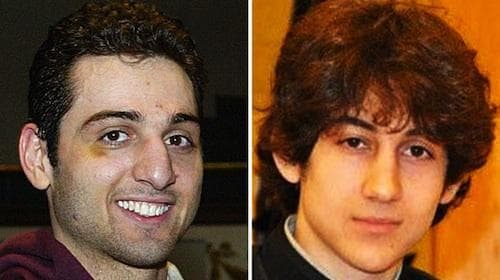Advertisement
The 'Folie à Deux' Theory Of The Boston Bombings

From the moment the two Boston bombing suspects were identified, acquaintances and strangers alike have speculated that the older, ex-boxer brother had dragged the younger, mellower brother into badness. The Boston Globe's Deborah Kotz offers a round-up today of such psychological theorizing, including a comparison to the 2002 Washington sniper case in which 17-year-old Lee Boyd Malvo fell under the influence of an older father figure.
Personally, my favorite theory comes in this Huffington Post diatribe: "Are The Boston Bombers Just Douchebags?" But epithets, however satisfying, cannot stem curiosity. And one of the more interesting possible elements of emotional explanation comes from Harvard psychiatrist Harold Bursztajn, who raises the possibility of a psychiatric diagnosis called "Shared Delusional Disorder" — long known in literature as a "folie à deux," French for madness shared by two.
The diagnosis is not new to the upcoming DSM-5, the psychiatric "bible" of diagnoses. But it is, Dr. Bursztajn said, the only diagnosis in the official compendium that is, at base, "relational." He defines Shared Delusional Disorder as a situation in which one person in a close relationship, usually the dominant one, develops a delusion and pulls the weaker person into it. It is considered rare, but is probably under-diagnosed, he said, because it tends to involve paranoia and concealment.

"The delusions are concealed, and can be concealed more successfully because there's someone else to share them," said Dr. Bursztajn, co-founder of Harvard Medical School’s Program in Psychiatry and the Law. "You have company in your delusion, so you don't need to tell anyone else. Good psychodynamic training is all the more vital to treat a disorder that is fundamentally relational and which involves concealment, because if you don't know how to help people overcome their shame and defensiveness and fear about how crazy they are, then people won't show you."
Shared Delusional Disorder commonly shows up as Munchausen by Proxy, in which a parent becomes delusionally concerned that their child has an illness, and the child begins to believe it as well.
"One person has the delusion," Dr. Bursztajn said, "and the other person is dependent, emotionally or physically. The dependent person feels that a condition for being loved is to buy in to the delusion, so they buy in to it and then the two of them have a system going...The two people lose touch with reality and form a bond against either a common enemy or, in the case of Munchausen by Proxy, it's against nature itself and against the human condition, which is that we're all fragile."
So how might this have worked for the Tsarnaev brothers?
Dr. Bursztajn has not treated or examined the suspects, so he cannot speak about them specifically, he said. But in general terms, a pair may believe, for example, that "someone or something in life has shortchanged them, and therefore, based on that, they have either a carte blanche - or they've been commanded by God if it's psychotic — to redress that, to revenge themselves. Often, there may be some grain of truth on a beach of sand, and what they focus on is the grain of truth and overlook the fact that they're on the beach."
'That absence of questioning is a real part of the disorder.'
The dependent member of the pair may feel that "'If this is what it takes for me to be admired and loved by you, I'm going to believe whatever you believe without checking reality,'" he said. "That absence of questioning is a real part of the disorder. It's a denial of one's own imagination, because people don't say, 'Maybe I'm imagining this.' Their imagination is constricted and denied."
Media accounts of the Tsarnaev brothers' mother, who steadfastly denies that her sons could be guilty, have made Dr. Bursztajn wonder whether she could have contributed to the atmosphere between the brothers. In a delusional system, he said, participants tend to be unconscious of their motives, and hypothetically, "If there's a feeling that 'I am going to have God's love and mother's love if I go ahead with this' — if I believe this, it's sure enough a great incentive."
So what are the warning signs that you or I might have fallen into a shared delusion?
"If you have a conviction that not only you cannot question something but you get extremely defensive about it if anyone else questions it," Dr. Bursztajn said. And "within the relationship itself, if someone gets extraordinarily defensive with you. If, even if you tactfully question someone, they begin to become enraged with you, they may be trying to impose their delusion on you. There's no respect for any questioning."
Readers? Ringing any kind of bell?
This program aired on April 29, 2013. The audio for this program is not available.
